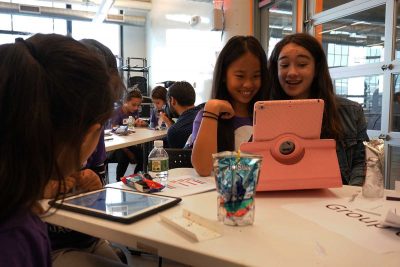
“We Are the Champions” blasts through the room, echoing off of the panoramic windows that show a sliver of the Boston Harbor. At one of the crowded white tables, two girls lean over an iPad together, so close that their foreheads nearly touch as they giggle.
Across the sea of tables and chairs, a little girl with wavy blonde hair and a nametag with “Annie” scrawled on it shouts, “I’m a genius!” She proudly shows the project she’s working on to a volunteer sitting next to her. The excited chatter emulates something one might find on an elementary school playground, yet none of the girls are here to play foursquare or kickball — they’re here to code.
At HUBweek’s “Girl Hackathon,” elementary and middle school-aged girls from the Boston area came together to share their interest in technology and coding. The girls worked in small groups with instructions from Hopscotch, a beginners’ programming guide, to create iPad games.
“With events like this, you are creating a space in the community where it [coding] doesn’t have to be a solo event,” said Lyndsey Mugford, a sophomore at the Milton Academy in Milton. Mugford’s teacher, Chris Hales, encouraged his programming class to volunteer at the event.
Shayne Gilbert, a founder of Girl Hackathon, said she was inspired when her 11-year-old daughter, Marlie, came home from school with a programming project she was creating on Hopscotch.
“I know from past work that I’ve done that the upper elementary and middle school years are the most vulnerable years for girls when they tend to get turned off to science and technology, because there’s a bias towards it still being boy-centric or male-centric,” Gilbert said. “And I thought that the idea of getting a group of all girls in a room, coding together, they would be able to inspire one another and share their creativity.”
While many different pieces go into coordinating the Girl Hackathon, the team put a particular interest on female role models. At every table, female coders worked in small groups with the girls to help them with their projects.
“The only way for girls to get ahead in this world is to be mentored by other girls,” said Colleen Bielitz, vice president of Institutional Advancement at Becker College, which helped organize Girl Hackathon. “We have to kind of reach out and pick each other up and lead the way for each other … right now, when they’re young, so that the girls know that they can do anything that a man can do.”
While Milton Academy programming teacher Chris Hales agrees that there needs to be significant changes for female coders, he also condemned the current view towards coding overall.
“I think people in general think programming is for programmers, and I think that’s like saying learning English is for people who write books,” he said. “Everyone uses programs all the time, for everything that they do, and most people have no idea what they are.”
Shirley Stephanie Pottinger, a Boston-based middle school science teacher whose daughter was one of the 40 girls participating in the Hackathon, said she felt that schools need to make a greater effort to integrate computer science.
“The kids are interested — they play with these apps all the time — so if they learned the software behind that, I think it’d be more relevant and definitely encourage them,” Pottinger said.
As the Hackathon event came to a close, each girl was invited to present her program. When the Smartboard wouldn’t work, the girls brought their chairs into the middle of the room and sat arm-to-arm to watch each game directly on the iPads.
Two fifth graders clad in skirts, patterned leggings and purple “Girl Hackathon” shirts came up to show off their “Crossy Roads” game. The objective was to get an ice cream cone across a street without being hit by the giant monkey, the Venus Fly Trap, the skull or two cars rushing around the screen. When they finished, as with every group, the crowd erupted into applause.
From the back of the room came a raised hand, shaking back and forth as wildly as the flying monkey.
“Can I try it?” asked a petite brunette, a huge grin spreading across her face.
Mugford said she hopes earlier exposure to coding will not only expand the field, but also give girls the confidence they need to stay with it as they get older.
“Often times, girls do get left out of this movement, and it’s taking over industry,” Mugford said. “It’s the new revolution. Girls shouldn’t be and won’t be left out. I know that having this sort of thing when I was little would’ve been … awesome.”



























































































































